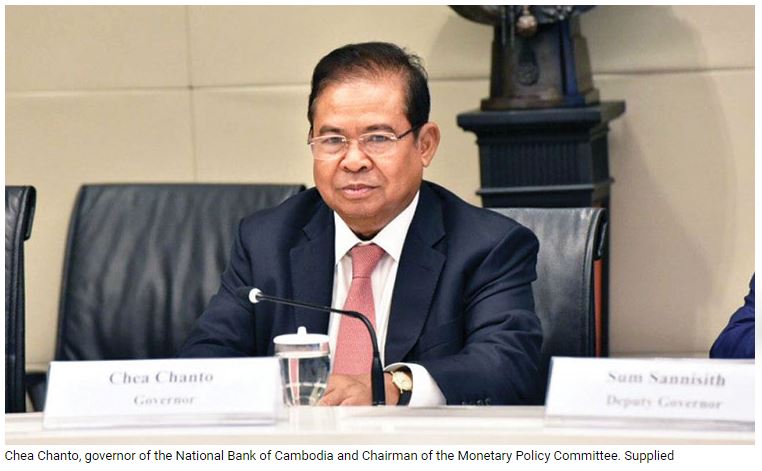Cambodia – NBC’s intervention stabilised exchange rate: Governor
Inflation in Cambodia rose to 7.2 percent in May, the highest level in more than a decade. In this context, the National Bank of Cambodia (NBC) has weighed in on the monetary policy to control inflationary pressures and support the recovery of economic growth.
To contribute to controlling inflationary pressures, the exchange rate has been maintained to protect the purchasing power of the riel as well as the income of vulnerable people.
Speaking at the first semester meeting of 2022 of NBC yesterday, Chea Chanto, Governor of the NBC said that due to the dollarisation, exchange rate fluctuations have a direct and rapid effect on inflation in Cambodia. When the riel depreciates, it will immediately increase the prices of goods and services, he added.
He went on to add, “The effectiveness of the exchange rate stabilisation policy is mainly supported by sufficiently high levels of international reserves that strengthen the confidence of investors and the public in the ability of the National Bank of Cambodia to intervene in the foreign exchange market. Cambodia’s international reserves have been kept strong in a situation where some countries are facing a decline in international reserves due to the effects of capital outflows.”
Secondly, exchange rate guidance through the official exchange rate of the National Bank of Cambodia as the monetary authority, the National Bank of Cambodia has the role of maintaining the value of the riel and setting an appropriate official exchange rate based on the exchange market conditions to contribute to maintaining national macroeconomic stability.”
“In addition, the official exchange rate plays an important role in the accounting registration, and payment of ministries, public and private institutions, and appropriate liquidity management through the issuance of liquidity in riel through Liquidity-Providing Collateralised Operation (LPCO) and the absorption of excess liquidity in Negotiable Certificate of Deposits (NCD).
In order to support and promote economic growth, the monetary policy has been pursued by maintaining a reserve requirement rate of 7 percent in both riel and currency, which has enabled banks and financial institutions to have more cash on hand.
This, combined with the continued implementation of favourable macro measures, has enabled banking and financial institutions to be able to allocate credit to priority sectors with reasonable stable credit interest rates, and to continue to respond to credit restructuring,” he pointed out.
According to Financial Stability Review 2021 report, NBC sold nearly US$ 600 million in 2021 to banks and money changers through auctions to stabilise the exchange rate that was under pressure due to the decline in tourism and remittance receipts coupled with other challenges faced by the country in its recovery process amid the lengthy pandemic. Thus, the exchange rate was KHR 4,099 per US$, depreciating by approximately 1 percent compared to 2019.
Meanwhile, the National Bank of Cambodia has tightened precautions in the wake of the pandemic, especially capital, high liquidity levels and conservative provisions, which have allowed the NBC as well as The Bank System of Cambodia to be able to implement regulatory easing in times of crisis and during the economic recovery.
However, a number of crisis exit measures have been taken more carefully in line with the economic recovery and to strengthen the resilience of the banking system, such as continuing to allow banks and financial institutions to restructure credit until June 2022. For customers who have never been restructured and will gradually start to make provision for restructured loans classified according to the actual situation.
The Covid-19 crisis has dramatically changed the business behaviour of both producers, sellers and consumers, relying more and more on online shopping, which can be more convenient both domestically and internationally.
In line with this development, the Cambodian payment system has been continuously developed and modernized based on the development of new financial technologies that promote interoperability and cross-border connectivity and strengthen payment to be more efficient, secure and affordable to support economic activity as well.
In fact, the Cambodian Shared Switch system, the Bakong system, and recently KHQR, the common standard QR code for Cambodia, was officially launched, with the mobile application of the Bakong System member institutions being able to scan payments.
Cambodia’s payment system is also expanding its regional connectivity, which is currently connected to Thailand and Malaysia, and is further connecting with Laos and Vietnam to support bilateral trade and investment, tourism and
remittances from Cambodian workers abroad.
Source: https://www.khmertimeskh.com/501116558/nbcs-intervention-stabilised-exchange-rate-governor/


 English
English




